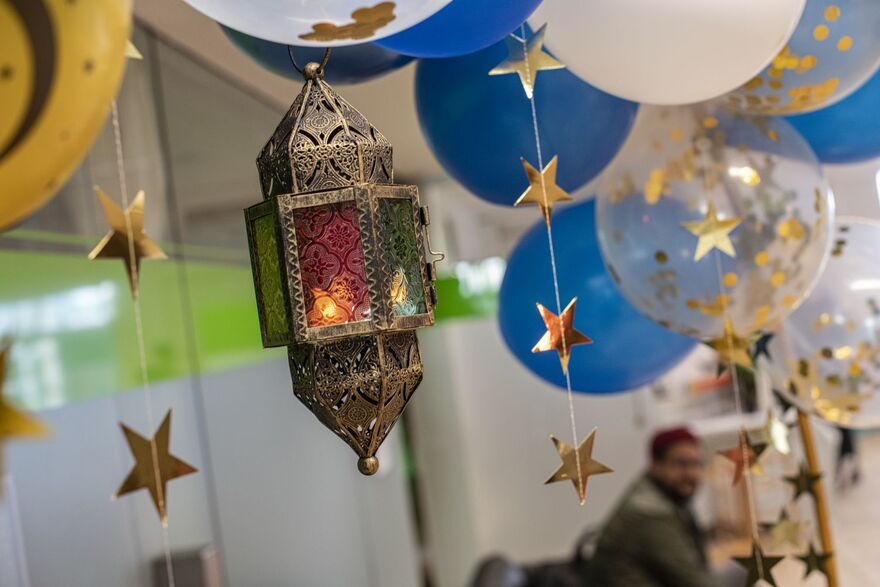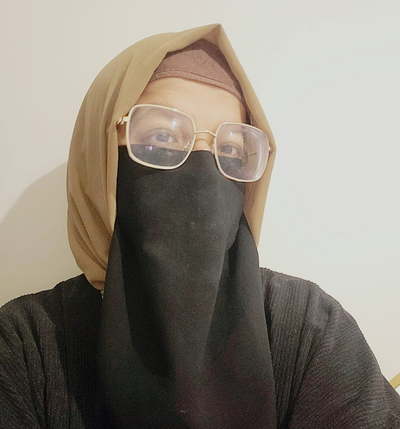Your questions about Ramadan | Guest Blog by Hafzah Zamir
14 Mar 2024
Each year at Baltic we bring people of all faiths together to explore and engage with the Islamic tradition of breaking fast during Ramadan. This event is called Open Iftar. We caught up with Hafzah Zamir who works closely with us on this project and has answered some of your questions on Ramadan...

There are many questions that surround the subject of Ramadan. From ‘why do Muslims fast?’ to ‘why do you do this to yourself?’ We asked our community the questions they wanted answering about Ramadan but were always too afraid to ask their Muslim friends. Today we’ll answer them.
1) Q. Why do you fast when it’s so hard?
There are many reasons why us Muslim’s fast. Firstly, it is important to establish that it is compulsory for all Muslims to fast, as it one of the five pillars of Islam. It teaches Muslims the art of self-control. As Muslims, if we are able to abstain from food, drink and intimacy, during the hours of fasting, then things that are sinful are quite easy to avoid. In addition to this, it is also important to note that it makes Muslims aware of being grateful for what they have, and to understand the importance of appreciating and focusing on the positive aspects of life such as health and amenities.
2) Q. What age do people do people start fasting?
Like many aspects of Islam, fasting is recommended when you hit puberty. It is well understood that children are perhaps not always able to fast for the full amount of time due to the demands that come from fasting. Therefore, it’s important to have a conversation with children; introducing the idea of fasting carefully. There are some that may feel they can go the entire day; which then we would encourage; and some that feel that they can also do a few hours to start with, which we would also encourage. However, it is important to note that if a child feels weak or sick, it is important that they break their fast as health always takes precedence.
3) Q. Are there times when people do not fast?
As mentioned earlier, fasting is not for everybody. Some of the people that are exempt from fasting include prepubescent children, the elderly, pregnant or menstruating women and travellers. In Islam health is so important, and if there is a reason that could be detrimental to you (for example if you stopped taking prescribed medication that could affect your health) then you should not fast. If there is a valid reason as to why or how this could affect someone or in turn, a person they are responsible for, they are permitted to not fast.
4) Q. What happens if someone were to accidentally break their fast?
To answer this question simply, if someone were to accidentally take a bite of something or to take a drink simply because they forgot, then they are permitted to carry on with their fast.
5) Q. Do we lose weight during Ramadan?
This is a subjective question; it all depends on the person. Some may think that because you don’t eat or drink during the times permitted, that you are eating less. However, for some people, more is eaten during the times that we can eat and the food consumed often can be quite unhealthy due to those late night ice cream cravings!
6) Q. Is it true you don’t drink water?
That is true! Muslim’s don’t consume anything during the hours of fasting.
7) Q. Does fasting have an effect of energy levels?
For the majority of people it does. As previously mentioned, fasting effects different people in different ways. Some may have more tedious and laborious jobs compared to others. Therefore, there may be people who are more fatigued than others. It’s important that we pace ourselves and take our time with our daily routines.
8) Q.What is that celebration called at the end of the month of fasting?
This is known as Eid-Al-Fitr, and it marks the end of Ramadan. Families get together to eat delicious food and exchange gifts.

Meet Hafzah Zamir
Hi everyone, I'm Hafzah, and I am the Writer in Residence for the Open Iftar here at the Baltic.
My goal is to transport you to different worlds and experiences through my writing, hoping that you become immersed.
I have been writing for as long as I can remember, and it is truly my passion. Knowing that I can bring people to feel certain feelings with my writing.
So spare a moment, and have a read of some of my pieces of writing about Ramadan.
Happy reading!

